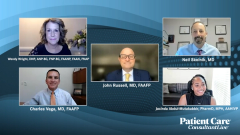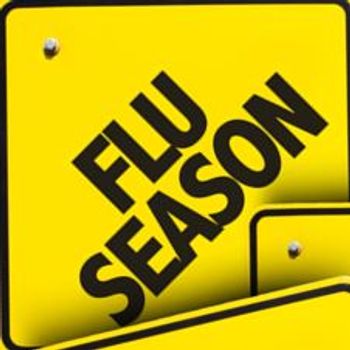
A Conversation On The Perspective Change Surrounding The Impact Of Influenza
Wendy Wright, DNP, ANP-BC, FNP-BC, FAANP, FAAN, FNAP, shares her thoughts on the changing perception of influenza and influenza vaccination post the COVID-19 pandemic.
Episodes in this series

John Russell, MD, FAAFP: Hello, and welcome to this Consultant Live program entitled “Protecting Against Influenza: A Comprehensive Guide to Informed Vaccination.” I'm Dr John Russell, a clinical professor of family and community medicine at the Sidney Kimmel Medical College at Thomas Jefferson University in Philadelphia, Pennsylvania. I've got a great group with me today, and I'm going to have them each introduce themselves, starting with you, Jacinda.
Jacinda Abdul-Mutakabbir, PharmD, MPH, AAHIVP: Hi, everyone. My name is Jacinda Abdul-Mutakabbir, but I go by JAM, like peanut butter and jam. I'm currently an assistant professor of clinical pharmacy at the University of California, San Diego, in La Jolla. I am also a professor in the division of the Black Diaspora and African American Studies, and my research program is catered to racial disparities within minoritized communities and throughout infectious diseases. But for the purposes of this conversation, I do vaccine uptake strategies and mitigation within racially and ethnically minoritized communities.
John Russell, MD, FAAFP: Awesome. Glad you're here.
Charles Vega, MD, FAAFP: That's great work. My name is Chuck Vega, and I am a clinical professor of family medicine at the University of California, Irvine, where I also serve as director of UC Irvine’s Program in Medical Education for the Latino Community. And I'm an assistant dean for culture and education here at UCI School of Medicine as well. Thanks for having me.
John Russell, MD, FAAFP: Chuck, it's great to have you. Wendy?
Wendy Wright, DNP, ANP-BC, FNP-BC, FAANP, FAAN, FNAP: Hi, everyone. Dr Wendy Wright, adult and family nurse practitioner, owner of a nurse practitioner-owned and operated primary care clinic, located in New Hampshire. It's my pleasure to be here. My doctoral work was in the area of vaccine uptake with particular focus on vaccine communication.
John Russell, MD, FAAFP: Terrific. Thanks for being here. And Neil?
Neil Skolnik, MD: I'm Dr Neil Skolnik, professor of family and community medicine at the Sidney Kimmel Medical College of Thomas Jefferson University. My core interest is diabetes. And with regard to that, I've had a long-term interest in the effect of influenza and influenza vaccination in patients with diabetes.
John Russell, MD, FAAFP:So, I got an amazing team with me today. It's going to be a great hour of education. So, today's discussion will center around the upcoming flu season, emphasizing the significance of timely vaccination, the range of available vaccine types, and the role of clinicians, of pharmacists, and what role we play in educating patients about the importance of being vaccinated. We're also going to explore 3 patient cases to illustrate some real-world scenarios and explore the best practices in flu vaccination strategies. So, let's get started. So, first question is going to be for you, Wendy. It's been about 3 and a half years since the start of the COVID-19 pandemic. In your practice, how have attitudes and approaches changed when it comes to flu over that trajectory?
Wendy Wright, DNP, ANP-BC, FNP-BC, FAANP, FAAN, FNAP: Thank you for that question. I'm going to ask that our listeners go back 2, 3 and a half years ago when COVID-19 first hit. And I want you to think back about the messaging that we all had as clinicians, which was really “Get your flu shot. We don't want you in the hospital. We don't want you in the emergency room. Many practices are closed. You need to get vaccinated.” And there was a real uptake that year in flu vaccination. Let's jump forward to where we are now. And I can tell you, after 31 years of practice, that last year was single-handedly the hardest year for my clinic to get flu shots into the arms of our patients. And I think a lot of that is because there's a lot of vaccines that we're giving out. But there's this real sense— and I know we're going to talk about this later—but this real sense of vaccine fatigue, not just among our patients, but also among our clinicians and our colleagues as well. So, with that said, the flu is as important as ever, maybe even more important, because what I'm seeing in my clinic and what I saw this year was a significant number of cases of flu. Many of those patients had coexistent infections, including COVID-19 and RSV [respiratory syncytial virus]. So, the question becomes, what does that look like for them in their future? So, I think flu and flu vaccines are so incredibly important.
John Russell, MD, FAAFP: And certainly, I saw people who thought, “Well, I got a COVID-19 vaccine; I don't need a flu vaccine.” So, I think as an education point, do you agree?
Wendy Wright, DNP, ANP-BC, FNP-BC, FAANP, FAAN, FNAP: I agree. And I don't think that the average person necessarily understands the differences in the viruses, because when COVID-19 first came out, there was this whole discussion about, “Is it similar to flu? Oh, it's just another flu.” What we've learned is that each of these different viruses bring to the table its own sequelae. And I think we as clinicians really just have to keep our foot on the gasoline pedal because flu is not going away. And we really need to make sure that our patients are as protected as possible.
John Russell, MD, FAAFP: I'm going to transition to Chuck, because you brought up respiratory viruses and I know it is a personal interest of his. So, Chuck, we're soon in the midst of our fall coming with all the respiratory viruses. So, can you comment on the burden of respiratory viruses and how kind of the “tridemic” might all fit in?
Charles Vega, MD, FAAFP: Right. And that's always the concern. And we've been worried about that since the advent of the COVID-19 pandemic, is that we could have a confluence of RSV, influenza, and SARS-CoV-2 all circulating at the same time, all presenting fairly similarly in terms of the clinical presentation and putting, unfortunately, a lot of folks in harm's way, even hospitalized or even causing increased rates of mortality. So, what we haven't seen that we actually remember at the latter half of the winter of 2020, 2021, there was barely any flu detected. And then this last flu season, it did return and we did, we saw an earlier increase in flu than we normally see. So, we saw rates increasing in the fall. So maybe it's starting to return to its more temporal features. Prepandemic, you can count in the United States between 9 million and 35 million cases of flu. Tens of thousands of people hospitalized. It was the eighth leading cause of death in the US. So, it's had a significant impact over time. If you just look at the clinical impact for most cases of uncomplicated flu, still it's going to cost people an average of 2 to 3 days of work. It's going to engender 1.3 or so visits to a health care professional, which creates more burden on a pretty stressed-out system. So, flu remains very impactful. We saw it again happen after essentially a year and a half hiatus in 2022-23. And I think we're going to see the same thing in 2023-24.
John Russell, MD, FAAFP: And where did all this RSV come from last year?
Charles Vega, MD, FAAFP: Right, and so we knew RSV was still having outbreaks, especially in the Midwest. We knew that back in 2021 there was an outbreak in the summertime, which was really quite unprecedented, but shows that these viruses aren't always going to remain suppressed. You know, and thankfully, we have different tools. Not only do we have a flu vaccine, but now we have an RSV vaccine. And, so, while these continue to be a challenge—it's a challenge certainly diagnostically, it's a challenge definitely in terms of public health—these new tools, I think, will really help us to lower those numbers and keep people safe over time.
Transcript is AI-generated and edited for clarity and readability.
Newsletter
Enhance your clinical practice with the Patient Care newsletter, offering the latest evidence-based guidelines, diagnostic insights, and treatment strategies for primary care physicians.

































































































































